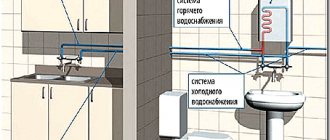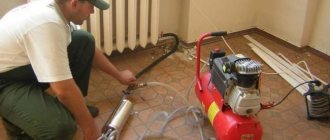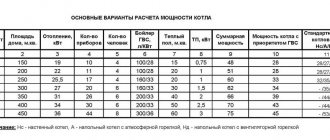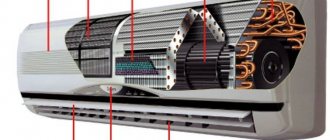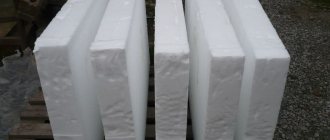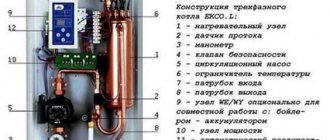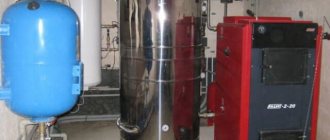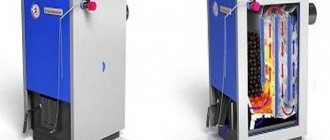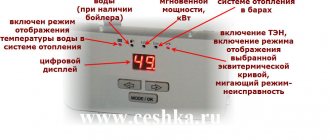Backup heating boilers for private homes can be similar, using the same type of fuel, or alternative in terms of the energy carrier used. Thus, backup boilers can be diesel, solid fuel, gas and electric. In this excursion we will discuss the use of a Russian-made backup electric boiler “Rusnit”.
Backup electric heating boiler in a private house
Installation work of the heating system of a country house is carried out according to standard heating schemes or according to the heat engineering specifications of the project. Preliminary calculations and methods for installing boiler equipment create a general picture of the technical design without an in-depth analysis of the characteristics of the object for design, installation, and commissioning work on heating in a residential building or industrial premises. Guided by experienced determinations of hydraulic calculations and the level of maximum heat loss in the premises of the house, a clear visual indication of the location of the most vulnerable area for heat loss, the specialist always reserves the right to recommend a backup heating boiler for the safe use of the heating system in a private house in emergency situations that arise in winter during a sharp drop in temperature outside.
| Monday | Open 24 hours |
| Tuesday | Open 24 hours |
| Wednesday | Open 24 hours |
| Thursday | Open 24 hours |
| Friday | Open 24 hours |
| Saturday | Open 24 hours Now open |
| Sunday | Open 24 hours |
The technical resource of a back-up boiler for heating a dacha is, first of all, considered when using water as a coolant. Today, it is just right to use an electric backup heating boiler for systems with antifreeze, due to the frequent replenishment of the heating system with water and its high concentration in antifreeze when interacting with hot water supply. Here, a rupture of heating system communications is possible due to freezing of the coolant in critical places of the heating system of the house itself. Therefore, a backup alternative electric boiler will always help in such situations. Installation of an additional electric boiler Rusnit is an inexpensive technical measure, the price of a boiler for a private house is 120-250 sq. m suits any owner.
Engineering communications service Heating, water supply, drainage, sewerage systems
around the clock tel: 8
INSTALLATION, REPAIR, MAINTENANCE, MODERNIZATION, REPLACEMENT
Backup boiler paired with an electric boiler
Electrical networks in the current state they are in cannot be considered a guaranteed source of energy for heating a home. This means that any heating system using electricity must be duplicated.
If you have an electric heating boiler with a liquid system installed, you need to select a backup for it - a backup boiler that will work during periods of power outages or at times when not all phases have sufficient voltage to heat the house.
Which backup boiler should I choose to pair with an electric one? This can be any boiler with an autonomous fuel supply:
- Diesel boiler with a tank for diesel fuel.
- Solid fuel boiler with a supply of firewood, coal or pellets.
- Gas boiler on a gas train or connected to a gas holder.
If you heat your house with a system of electric convectors, it is not economically feasible to install a backup liquid heating system with radiators and a boiler. In this case, it is better to use an air heating furnace as a backup heat generator. This could be a stationary brick stove, a steel or cast iron stove, or a fireplace stove.
These can also be gas convectors, powered from a system of gas cylinders with a decent volume - 27 or 50 liters.
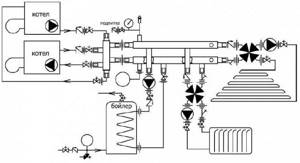
Since electricity is the most expensive energy carrier for heating, any heat generator using any fuel can perform the function of backup heating.
No. 1. Advantages and disadvantages
An electric heating boiler works extremely simply. In it, electrical energy is converted into thermal energy. When the boiler is turned on, the heating elements heat the coolant. The latter enters the living space through a system of pipes and radiators and heats the air in it. In the simplest and most common version, the usual heating element is used as a heating element, but there are also induction and electrode boilers in which heating is carried out somewhat differently. The only thing that remains unchanged is the power source – electricity. Many boiler models are equipped with a monitoring and control mechanism.
Despite the fact that electric boilers can hardly be called an economical source of heat, they are very popular, and there are many reasons for this. The advantages of electric heating boilers include:
- versatility. The unit can be installed wherever there is electricity ; no permits from technical supervision authorities are needed. Today, electric boilers are used both in private homes and apartments, as well as in commercial and industrial premises;
- low cost compared to gas and solid fuel boilers;
- high efficiency , which reaches 95-99%;
- ease of installation. Electric boilers are small in size , and when connecting them there is no need to build a chimney;
- ease of operation and temperature adjustment. Most models are equipped with convenient control systems and thermostats, so the user just has to press a few buttons or turn a lever - he won’t have to constantly run to the boiler, control its operation, or, worse, add fuel. Since the boiler perfectly controls its operation, its efficiency increases;
- safety . There is no open fire in electric boilers, and no flammable fuel is used. Plus, well-thought-out automation is used, so the likelihood of emergency situations compared to other types of boilers is sharply reduced, if, of course, the installation was carried out correctly;
- compactness, so installation of such a unit is possible even in the smallest rooms;
- environmental friendliness, because no harmful emissions are generated during boiler operation;
- noiselessness;
- no need for constant monitoring of operation (you can leave the boiler unattended) and frequent maintenance. Solid fuel boilers, for example, require constant care and cleaning;
- a wide range of. There are models on the market with different power (from 2 to 60 kW or more) and functionality (single-circuit and double-circuit).
disadvantages :
- high cost of operation. Despite advanced automation and energy saving systems, electric boilers are still quite expensive to operate. In most cases, it is not profitable to use them for heating large rooms. Often such boilers are used as a backup heat source ;
- dependence on the availability of electricity. If the region experiences frequent power outages, then this heating option is not suitable;
- the need for special three-phase wiring if a boiler with a power of more than 12 kW is used. Some experts recommend using a line with three phases even when connecting a boiler from 6-7 kW.
Despite the existing disadvantages, electric boilers find their buyers. Moreover, if you carefully analyze the conditions at the site where you want to create a heating system and choose the right electric boiler, you will be able to enjoy the positive qualities of these devices to the maximum.
Backup boiler paired with a gas boiler
In the case when gas consumption in the gas pipeline increases during frosts, the final household at the end of the “pipe” may be left with virtually no gas. Some models of gas boilers will not be able to start and operate at minimum pressure in the gas main. Accidents on the gas main can also occur for various reasons - from illiterate excavation work to cases of arbitrary tapping into the gas main.
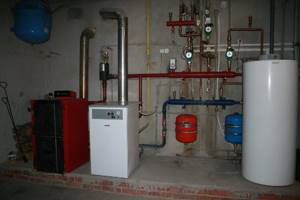
In this case, as well as in the event of gas equipment failure, for a period sufficient for the emergency team to leave, you will need a backup boiler in tandem with the gas boiler.
What are the possible options here? Any solid fuel or diesel boiler will be able to support your heating system while an accident on the main line is being repaired or gas equipment is being repaired.
If you have the opportunity to be at home during an accident, you can choose wood or coal boilers. If you need to leave at this moment, choose fully automatic diesel or pellet boilers.
The model in this case does not matter; what matters is the reliability of the backup boiler. For this reason, you should not reserve gas heating with electric boilers or convectors. Because electricity is an even less reliable form of energy for heating than mains gas.
Backup equipment – connection with the main heat generator
Incredible things happen in the world - the most reliable devices or systems can fail.
And the failure of the heating boiler or the interruption of gas or electricity supply is a normal situation. Therefore, at any time you may need a backup boiler, or any other heat generator, to help your main device. In order to select a backup boiler, it is worth understanding what unforeseen moments happen most often with your heating system. Highlight the most likely emergency cases:
And depending on what you often have to deal with, you can choose a backup heating system for your home.
We have already written about how to reserve power to the boiler on our website. And below you will find information on which backup boiler to pair with your existing heat generator.
Backup boiler paired with a diesel boiler
The best option for backing up liquid fuel heating would be either a second diesel boiler or a solid fuel boiler, as well as a gas boiler powered by a gas train - several cylinders connected to supply gas to the heat generator.
A second diesel boiler will work if your main unit fails. The backup will be powered from the same tank as the main heat generator.
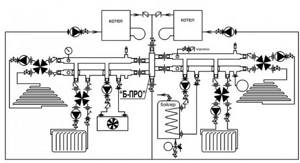
If there are problems with the supply of diesel fuel or with the timely purchase and delivery of fuel, then a backup boiler using a different type of fuel will help out.
Backup boiler using the same type of fuel
In comments on the website and in letters to the editor's email, our readers asked questions several times: is it worth running a system consisting of two heat generators using the same type of fuel?
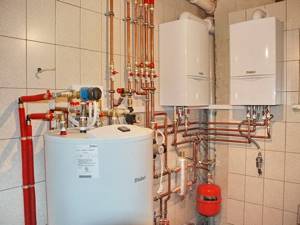
You can install two solid fuel or diesel boilers in combination. In this case, the fuel source is autonomous, and if it is available, the backup boiler will operate successfully.
In the case of main gas and electricity, installing a backup boiler only saves you if the heat generator itself fails. In the event of an accident on a power line or gas main, you will still need a boiler using alternative fuel.
More on this topic on our website:
- We choose a backup power supply for the boiler - generator, UPS, inverter. Winter, frost, smoke from the chimney. The picture is like a postcard. A good owner prepared in advance, the boiler was installed in the fall, it works perfectly, heats...
- Two boilers in a boiler room - how to connect - pros and cons Let's start with the fact that in a modern house located in the middle zone there should be 2 boilers. It doesn’t even have to be 2...
- Universal heating boilers for a private home Why are universal heating boilers needed for a private home, what justifies their use, why is it worth buying them? In what situation...
- UPS for TT boilers - differences and features We have already talked about gas boilers, about what UPS for a heating boiler using main gas is needed and should be...
UPS models
Energy PN-1000 is a powerful source of backup power. Thanks to the built-in stabilizer, the device provides the rated output voltage when the mains voltage changes within the range of 120-275 volts. The smooth sine waveform is ideal for powering a reactive inductive load, such as a heating system pump motor. The energy of the PN-1000, together with the Delta DTM 12100L 100A/h battery, provides uninterrupted power for a 150W heating pump for 8 hours. The device has a built-in network noise filter, information display and RS-232 interface.
You can find this and other voltage stabilizers for heating systems from the Energia company on the website of the official representative of the Energia.ru company.
The compact emergency power source Teplokom 222/500 is designed for use in gas heating systems. This simple device with a single-phase relay-type stabilizer ensures operation with a load not exceeding 230 W. The universal stabilizer Skat ST 1515 provides a voltage of 220 V with network fluctuations from 145 to 260 V and a frequency of 50 Hz ± 1%. If the voltage value exceeds the specified parameters, the load will be turned off automatically.
Let's sum it up
Based on the operational requirements for electric motors of heating system pumps, the UPS must provide the following parameters:
In addition, the device must operate in a certain temperature range and have a device for indicating modes and physical quantities.
